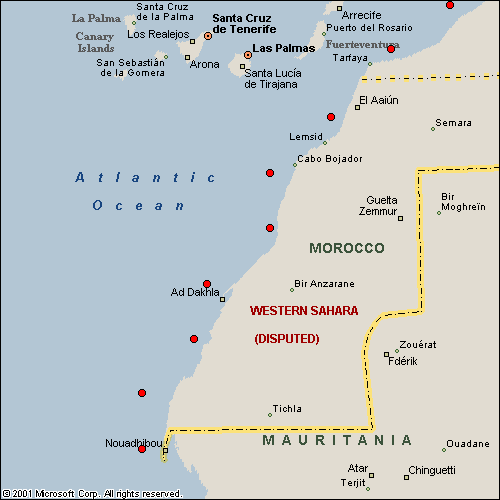
At the recent party congress of the Social Democratic Party in Sweden, there were several motions pleading for strong party action to "support the struggle for self-determination of the people of Western Sahara."
The party on Friday ended up demanding a Swedish recognition of Western Sahara should the party win the coming 2010 elections.
First European recognition?
The party executive had originally recommended its congress accept some of the demands for stronger actions, including an extended mandate for the UN peacekeepers MINURSO to monitor the human rights situation in the territory, but was hesitant to exclude Western Sahara from all EU-Morocco agreements, and said no to demands for recognition.
After a tough debate, however, the party congress accepted most demands in the motions, including that the party, if they are elected to government, will recognise the Sahrawi Arab Democratic Republic (SADR) and work for a recognition within the EU.
"Today’s decision is historic," said Jytte Guteland after the vote was clear. Ms Guteland is chairperson of SSU, the Youth League of the Social Democratic Party. "It is a first step towards a Swedish recognition of Western Sahara, which for long has been an issue between us and the party," she added.
"This is something we have worked for within all sections of the party," commented Johan Buser, International Leader of SSU. "Now we have to win the elections. In that case, Sweden will be the first member state of the EU to recognise Western Sahara."
Sahrawi Deputy Minister of European Affairs Mohamed Sidati, who was invited to speak at the Swedish party congress, also strongly welcomed the decision. "This initiative, in addition to being a bold action in favour of the struggling Sahrawi people, represents an important opportunity for the Sahwari cause in Sweden and Europe."
Morocco expels a Swedish diplomat
Morocco ordered on Wednesday the immediate departure of a Swedish diplomat accused of handing official Moroccan documents to Western Sahara-linked "separatists", the foreign ministry said.
 Foreign Minister Taieb Fassi Fihri summoned Swedish ambassador Michael Odevald to tell him of "a serious breach in diplomatic practice and an unacceptable professional error committed by an advisor at Sweden’s embassy in Rabat, Mrs Anna Block-Mazoyer," a statement said.
Foreign Minister Taieb Fassi Fihri summoned Swedish ambassador Michael Odevald to tell him of "a serious breach in diplomatic practice and an unacceptable professional error committed by an advisor at Sweden’s embassy in Rabat, Mrs Anna Block-Mazoyer," a statement said.
Block-Mazoyer "gave an official document that was given by the foreign and cooperation ministry to the Swedish embassy in Rabat as part of a diplomatic process to separatist elements linked to Algeria and the Polisario Front."
"This document then turned up in the hands of enemies of the kingdom’s territorial integrity," it said.
The Polisario Front seeks independence for the Western Sahara, a territory annexed by Morocco after Spanish settlers left in 1975.
Autonomy vs full self-determination
The former Spanish colony of Western Sahara has been occupied by Morocco since the colonial power left the territory, leaving most of its inhabitant in Algerian exile. Soon after the proclamation of the Sahrawi Repulic, the occupied state was admitted as a full member to the OAS (now African Union).
A majority of African states have recognised the SADR. Further, many Latin American countries and some Asian countries have recognised Western Sahara.
No European country so far has recognised SADR as an independent state. On the other hand, no country has accepted Morocco’s territorial expansion either. Several political parties in Western and Northern Europe are currently working for a recognition of SADR by their countries’ governments.
UN-backed talks on the territory’s future are currently stalled. Four rounds of negotiations on the territory held in Manhasset, a suburb of New York, could not bridge the gap between Morocco and the Polisario Front. An informal bid to unblock negotiations took place on August 10 in Vienna.
Morocco offers considerable autonomy to the Sahrawi people. The Polisario Front wants a referendum on self-determination, with independence as one of the options.


